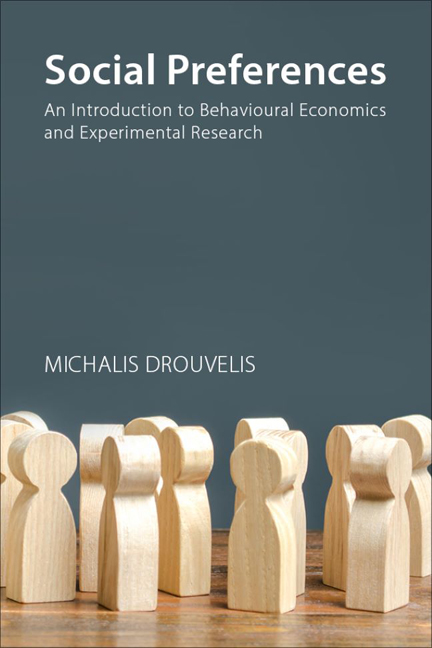Book contents
- Frontmatter
- Contents
- Preface
- 1 Introduction
- 2 Bargaining games
- 3 Trust and gift exchange games
- 4 Public Good Games I
- 5 Public Good Games II
- 6 Leadership
- 7 Public good games with sanctioning I
- 8 Public good games with sanctioning II
- 9 Cross-cultural experiments
- Appendix A Experimental instructions
- Appendix B Practical information
- Notes
- References
- Index
2 - Bargaining games
Published online by Cambridge University Press: 22 December 2023
- Frontmatter
- Contents
- Preface
- 1 Introduction
- 2 Bargaining games
- 3 Trust and gift exchange games
- 4 Public Good Games I
- 5 Public Good Games II
- 6 Leadership
- 7 Public good games with sanctioning I
- 8 Public good games with sanctioning II
- 9 Cross-cultural experiments
- Appendix A Experimental instructions
- Appendix B Practical information
- Notes
- References
- Index
Summary
Introduction
One of the most common aspects of economic and social life that people experience and engage in has to do with bargaining. Examples abound. Many professionals such as CEOs, consultants, brokers, political leaders and policy makers spent most of their career life negotiating with others, trying to determine the outcomes of bargaining processes that are likely to affect the lives of large groups. In various workplace environments, managers and labour unions bargain over terms and conditions of employment contracts or policies managing performance that may lead to promoting, demoting or even firing employees who underperform. In business settings, negotiations can take the form of complicated and endless discussions of delivering high-stake mergers and acquisitions among two or more firms or bargaining between two parties can be useful when establishing a partnership or making a big investment. In the real estate realm, homeowners and buyers often negotiate over the price of a house until a final deal is reached. And the list of bargaining examples can go on for ever, indicating how important bargaining is in our daily lives.
In some of these situations, the bargaining process reaches a point where one party has to make a final offer to the other party who can either take it or leave it. How individuals decide in this context is of crucial interest to understand. Are people motivated by pure self-interest trying to maximize their own earnings from the bargaining process or are they driven by fairness/equity or other pro-social concerns? One of the most well researched economic paradigms encapsulating the take-it-or-leave-it element of the bargaining process is the so-called “ultimatum game” inspired by Guth et al. (1982). In its original form, the ultimatum game consists of two players: a proposer and a receiver. The proposer is given a fixed endowment of money (say, £10) and proposes a split between him/herself and the responder. After observing the split, the responder decides whether to accept or reject this ultimatum offer. In case of acceptance, both parties receive the proposed split as made by the proposer. In case of rejection, both parties leave empty-handed.
- Type
- Chapter
- Information
- Social PreferencesAn Introduction to Behavioural Economics and Experimental Research, pp. 13 - 30Publisher: Agenda PublishingPrint publication year: 2021



